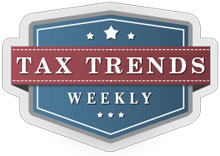Dow Jones Companies Are Paying Lower Effective Tax Rates
The Dow Jones Industrial Average is a widely-watched measure of the stock market. It reflects the performance of 30 of the largest publicly-traded companies in America, including Bank of America, Exxon Mobil, Johnson & Johnson, and IBM. These companies are some of the most profitable in the country, but the percentage of the profits they pay to the U.S. government in taxes has declined over the last three decades. While no precise numbers are publicly available, a company’s financial statements provide data that can serve as an estimate for how much it pays the U.S. government in taxes.
The numbers are striking. For example, according to an analysis done by the Washington Post, United Technologies listed its 2012 “federal tax expense” as only 5.8 percent of profits for that year. The corresponding number for Proctor & Gamble was 14 percent. The reason that many multinational companies have relatively low tax burdens is that the U.S. tax code does not impose federal taxes on corporations’ foreign earnings from active businesses (as opposed to passive investments) until such earnings are repatriated to the U.S. While the U.S. corporate tax rate is nominally 35 percent, the ability of corporations to keep their earnings overseas as long as they wish results in deferral of tax, the same concept that makes tax-advantaged accounts like 401(k)’s so attractive.
While corporate executives defend tax planning as a perfectly legal way to maximize shareholder value, many politicians and pundits are starting to express displeasure over what they see as free-riding by multinationals. In their view, U.S.-based multinationals derive many benefits from their connection to the country, such as an established rule of law, access to capital, and expansive securities regulation. But the same multinationals balk at paying the taxes which some commentators believe are essential to fund the infrastructure that provides for such advantages.

